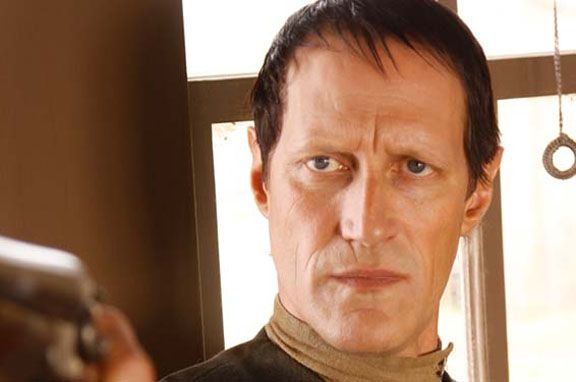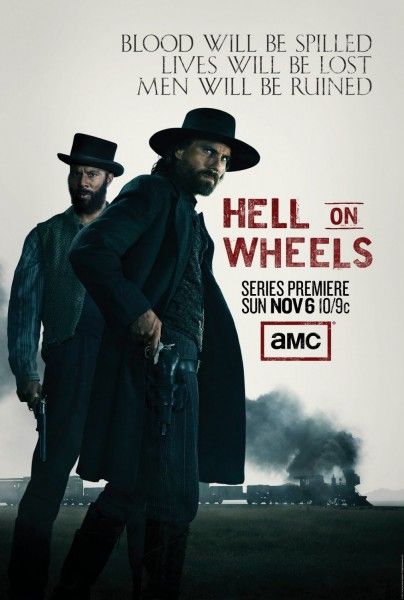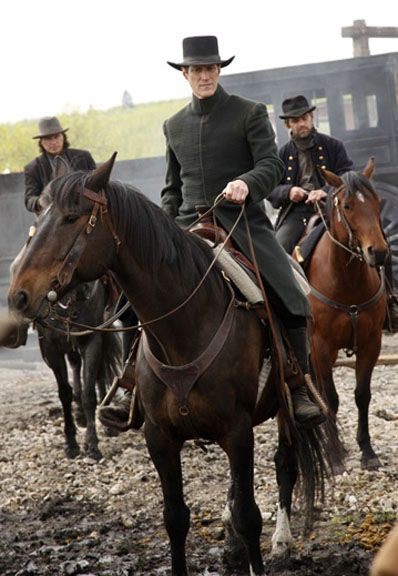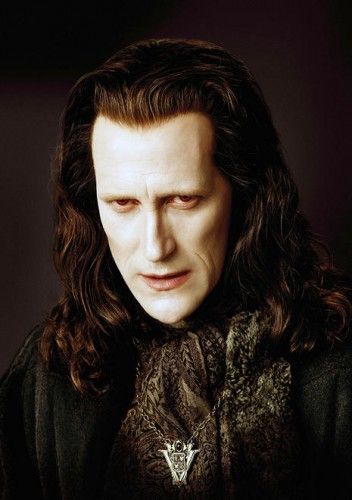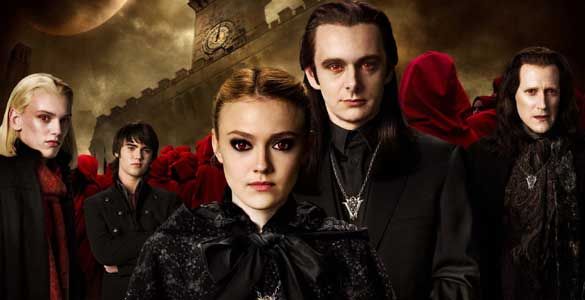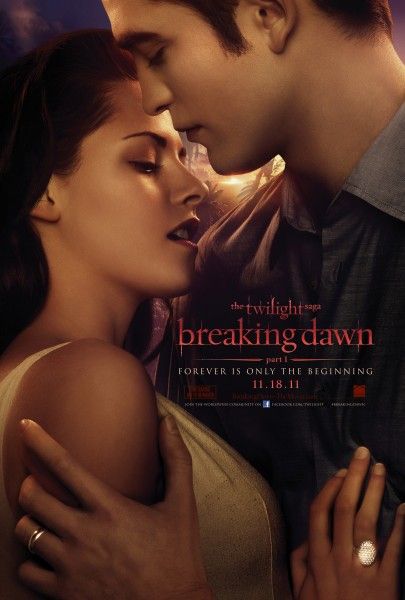On the AMC Western drama Hell on Wheels, actor Christopher Heyerdahl plays Thor Gundersen, also known as The Swede, who is Thomas Durant’s (Colm Meaney) ruthless head of security. His tactics help him maintain a degree of control over the chaotic traveling town, but he abuses his power to extort money from its residents.
During this recent exclusive phone interview with Collider, Christopher Heyerdahl talked about how he came to be a part of Hell on Wheels, what he enjoys about playing such a complex and complicated character as The Swede, that he’s developed the character through extensive research both in books and in his own Norwegian heritage, and the challenge of shooting the Western concurrently with his SyFy series Sanctuary. He also talked about playing the ancient Volturi vampire Marcus in the Twilight Saga films, the deleted scene from The Twilight Saga: Breaking Dawn - Part 1 that he hopes will end up on the DVD, what audiences can look forward to with Breaking Dawn - Part 2, and what it’s been like to have the support of genre fans. Check out what he had to say after the jump.
How did you come to be a part of Hell on Wheels?
CHRISTOPHER HEYERDAHL: Well, luck and providence, I suppose. They say, “What’s luck? Preparation and opportunity.” So, I guess the opportunity came, in the form of an audition. I put myself on tape, and they responded to it. I went in and did a call-back audition, and they felt that we were on the same track. My idea of who The Swede was, was the same as theirs, and vice versa. This kind of character is very rare, with the fact that it fit so well with my background and my understanding of a Norwegian man. It all just fell into place. I still get a little choked up thinking about how often a character like this comes along. For the viewer, it’s quite interesting. It’s not a character that we see very often, and certainly not in this form. As an actor, it seemed to be tailor-made for me. It’s quite wonderful.
The Gaytons and their writing team have really put together a difficult group of people, in that we can’t really pigeonhole them. There are so many wonderful characters in this tale. You have a hero, but is he a hero? I think he does hold true to that. The way Anson [Mount] is playing Cullen Bohannon, he holds everything very close to the chest. He hasn’t taken the easy way. You progressively get more and more evidence that he is, in fact, the hero. He makes very moral choices, and he hasn’t lost that moral stronghold and that thing that makes us good human beings. Whereas a character like The Swede, as hard as he may try, I think he’s lost a little bit of his morality.
The interesting thing about these characters is that they’ve all, for the most part, been through this tearing up of brothers and families, and they’ve come out of it scarred, as the country came out of it scarred. They’re interesting characters because of that. They’ve come through a really horrible thing, and how they’re surviving is not always pretty. A lot of them are lost, certainly, in Hell on Wheels. It’s a rough and tough group of damaged people. The lifespan for a woman in that town means that, theoretically, we really shouldn’t see any of them again next year. It was pretty awful for a woman.
When you’re doing a role on a show where it’s obviously a real period of time, what sort of research do you do, into the time period? Did you draw from your own heritage, as well as look at what books are available about it?
HEYERDAHL: Yeah. There are a number of books, just on that specific time period because it was such a huge part of American history. There are a number of books that were passed around, and that the Gaytons and the rest of the creative team had been looking at, as a guide to follow and move around, as far as the way one does, in telling a story. You try not to let the facts get in the way of good story. That’s the jumping-off point, so those books were being passed around. There’s also a wonderful thing called the interweb, but I tried to stay away from Wikipedia, bless their hearts.
Certainly, for Andersonville, I tried to do as much research as I could, specifically about Norwegians in Andersonville. When I was in Norway, a number of years ago, there was a wonderful show that was being done at the local museums, about the immigration of Scandinavia, about 10 years before the story takes place, when they all started to go to Minnesota. There was a grand exodus from Denmark, Sweden and Norway. There was one gentleman who had gotten control of a whole bunch of land, now known as Minnesota, and that’s why you have so many Scandinavians there. He basically invited everyone to come there and start a new life. There was also just trying to understand the mind-set of someone who would go to a place like that. It’s already quite an adventure to leave your own country and move into a new place today, but imagine when it really was like going to outer space or down into the bottom of the sea, where there’s a new frontier that is terrifying and unexplored.
There were so many things to draw on. I went and talked to my father about times, 70 years ago, when he was growing up. I would ask for stories from his parents, which would go back another 70 years, just to get a feel for the perspective, through some kind of oral history. It was a great experience because how often do you really sit down and talk to your family, or your extended family, about history. That doesn’t happen, every day.
Do you feel like this show has found the balance between giving you bits of history while still focusing on the characters’ stories?
HEYERDAHL: Absolutely. I think the characters are so well-drawn, and they’ve done a lot of research into the period, as a jumping-off point because who really knows what happened. It’s one thing for someone to put it down as a so-called historical fact, but we don’t really know. License is sometimes a liberating blessing. The show just gets better and better and better, the more opportunity we have to give historical fact, as well as character backstory, and trying to balance all sides out. There are so many demands on a modern historical tale to be politically correct, and I don’t think they’ve fallen too badly into that trap. I think they’ve been able to find a way to be true to the period, and also respect stories that need to be told today.
In playing this character, how do you view him? Do you see him as a villain, or do you focus on his human qualities and motivations?
HEYERDAHL: Yeah, I think it’s the only way. It’s funny, I’ve had a number of friends who have very kindly written me messages on my voicemail, and passing on things from other people, who really seem to enjoy loathing the character. They say, “As much as I hate him, I seem to still want to see more of him.” Somebody said, “In the first scene, he was so creepy,” and that really struck a chord with me. I thought, “Really?!” It’s very difficult for me, as someone who incarnates a character, to see that because I am trying to create a real human being and I don’t think any human being looks at himself and goes, “Oh, my gosh, you’re so creepy.” So, no, I don’t look at him as a villain. I suppose, if I was able to step back, he certainly does some villainous things and has questionable actions. But, from the inside, he’s trying to do what’s right, given the parameters of his job and his understanding of humanity, and also the fact that he has been heavily soured in his understanding of what humanity has become and is capable of.
In a town like Hell on Wheels, someone who is as devout and simple, in many ways – and I don’t mean that in an intellectual way – he sees people doing really awful things around him, and he wants to do everything he can to keep that to a minimum. I think he knows that humanity, in that circumstance, makes it very difficult not to do these things. He believes that, if he doesn’t keep a very strong hold on the activities of these men in this community, then it will fall apart. Unfortunately, it is full of people who are practiced in thievery, murder, and less than moral acts. He comes down with an equitable amount of the clout of the hammer. He comes down strong, in order to keep them looking around. They need to be aware that someone is there to punish them, if they step out of line. Today, the concept or idea of corporal punishment for a child growing up is almost unheard of in our society and frowned upon. And yet, 20 years ago, the majority of us grew up with corporal punishment as an accepted form of keeping someone in line. So, if you go back 150 years, it’s completely acceptable that corporal punishment, to an extreme, is the way to deal with punishing the human creature.
Was it important for you that this character also have some humor?
HEYERDAHL: Well, absolutely. Certainly, anyone whom I’ve witnessed, who has gone through something horrible and life-changing, has a sense of ironic humor, or an ability to look at the peculiarities of the world and find humor in it. Otherwise, I think you end up just slitting your own throat. And, I certainly think that The Swede is in danger of doing that, if he sits and wallows in the mistakes he’s made and the awful things that he has done. I think, as a witness to this weird and wonderful place that is Hell on Wheels, he certainly finds a lot of humor in it. It’s not a joke humor at all, but he certainly finds humor in the irony, for sure. I think he’s an awfully good chess player. He may not be seven moves ahead, but I think he’s at least four.
When you’re playing a character like this, does it help to be in the locations with the weather, the wardrobe and the hair?
HEYERDAHL: Mother Nature is the great equalizer. You can’t get away from it. The last time I was up there, I was doing a show called Into the West, and I was introduced to it then because we had some crazy weather. And then, I went back to do Hell on Wheels and we also had some crazy weather. Ultimately, we could get away. If we had to, we could jump into our trailers and go into the city and hide in these big concrete bunkers, and get away from the weather. But, we were reminded that these people could not. They were in the middle of nowhere. When the weather came through, they survived or didn’t survive. They did everything they could to protect themselves. Being reminded of that brings you to the reality of the situation for those people, and at that time.
Were you shooting Hell on Wheels at the same time you were doing Sanctuary?
HEYERDAHL: Yeah, it was absolutely a concurrent event. The producers at Sanctuary were very kind to see this character as something that I loved and wanted to play, and they gave me the space and created the space to do that. It wasn’t an easy thing for them to do. I think they may very well have cursed that decision, a number of times, but they continued to support the choice. George Horie with Sanctuary and Chad Oakes with Hell on Wheels got together, along with the two First A.D.’s, and worked out the scheduling. It was absolutely crazy, but it was fun. I had a great time because I didn’t really have to worry about it, but I know that the big-wigs were definitely earning their paychecks, trying to figure out how to get me from one set to the other. A lot of times, it was literally by the skin of our teeth, or the hair of our chinny chin-chin. It all worked out, but it was a heck of a ride. We wrapped both shows within a week of each other. It was a good year. I started out with spending time in Louisiana, pretending to be a vampire for Breaking Dawn, and then finished off in Hell on Wheels. It was good fun.
Do you have as much fun playing a member of the Volturi in the Twilight films, as it seems like you do?
HEYERDAHL: Yeah, we do. I suppose it will be on the DVD, but there was a scene that was cut from Breaking Dawn - Pt. 1. We originally book-ended the movie. At the beginning of the film, everyone received their invitation. It was a series of vignettes of the invitations to the wedding because the Volturi, of course, must be invited. Our reaction to the receiving of this lovely little invitation was very camp and great fun. I’ll look forward to seeing that on the DVD. But, they’re a good bunch.
How was Bill Condon to work with, as a director?
HEYERDAHL: We talked a lot about being a little more camp, and how every vampire story needs a bit of camp. So, we very happily played it camp.
When you became a part of the Twilight films, did you have any idea what you were getting yourself into?
HEYERDAHL: I had a pretty good idea. I was made aware of the books by my nieces, and my wife is a high school teacher, so she, of course, was in the middle of that, watching it go down, in and around schooltime. So, I had a good feeling that it was going to be a very popular event. Certainly, having seen Twilight, I knew there was such a strong movement with the films themselves. But, having seen the reaction to the books, it was a pretty safe bet that it was going to be a popular venture. It’s been a lot of fun. I love the vampire genre, and being able to play the oldest vampire, and certainly one of a band of old-timers, representing the old ways, was fun. And being a part of a project like that, where you get to witness how the new guard of actors in the business deal with the huge challenge of enormous popularity. I don’t think it’s easy for anyone, but I think that they are surviving it quite well.
What can audiences look forward to with Breaking Dawn - Pt. 2, in regard to your character and the Volturi?
HEYERDAHL: That’s always a difficult question to answer because I don’t want to put out any spoilers, but everyone’s read the book, so I think it’s relatively safe. There are some things that have come into the story, that are alluded to in the book, but aren’t necessarily expressed in word. They’re expressed in idea, in the book. Some of those things will be brought to fruition, visually, which was a lot of fun. It’s always fun to see a thought or an idea come to fruition. It’s almost like going into the mind of a character. You get to go along there, which is a wonderful thing for film. On stage, you can never really go into the mind of a character. You just follow along with a scene. Whereas with film, you can actually dive right inside. So, some of those events have been brought to life.
You definitely see a lot more of us. For the lovers of the Volturi, that’s going to be a positive thing. We certainly come in with our large wooden spoons and stir it up. I don’t think anyone will be disappointed by where the Volturi goes, and the aftermath. We really are a fun group of evil-doers. The interesting thing is that you’ve got this wonderful, complicated triumvirate of so-called brothers, who each have a different agenda, and you get to watch them try to ignite or ignore or tease or play with each other. You can only imagine that, when you’re hanging out for thousands of years, you’re going to get to know your partners quite well. A lot of times, each one of them tries to poke their fingers into their neighbor’s hornet’s nest to watch what happens. A little bit of that goes on, and there’s a lot of subtle pleasures that come out. You just get to see those relationships brought out a little bit more, in the second half. It’s good fun.
You’ve been on just about all of the favorite shows of any sci-fi fan, along with being in the Twilight films. What’s it been like to have the support of genre fans, with as dedicated and loyal as they are?
HEYERDAHL: The great thing about genre fans is that they’re not afraid to say who they are. A lot of other fandoms keep it a little bit closer to the chest. Genre fans are right out there. I went down [to Atlanta] to do Dragon*Con, which for the genre fans is the biggest fan-run convention out there, and there’s a huge parade where everyone is flying their flags and there’s so much support. Atlanta just comes out to observe. It’s pretty hard not to get involved and get swept along, literally and figuratively, by these massive amounts of people in this huge parade. It’s quite an amazing event.
So, being supported by a group of people like that is certainly a lot better than not being supported because they’ll let you know that as well. There are a lot of straightforward truths that have come out of a fandom like that. People in that fandom are very honest about how they feel. Because of that, shows rise and fall purely based on fandom, much more so than viewership, like with other shows. Fandom can keep something alive, and fandom can take it down. There’s a lot of power there, so because of that, there’s an enormous amount of, hopefully, mutual respect. So, I’m down with that fandom.

